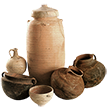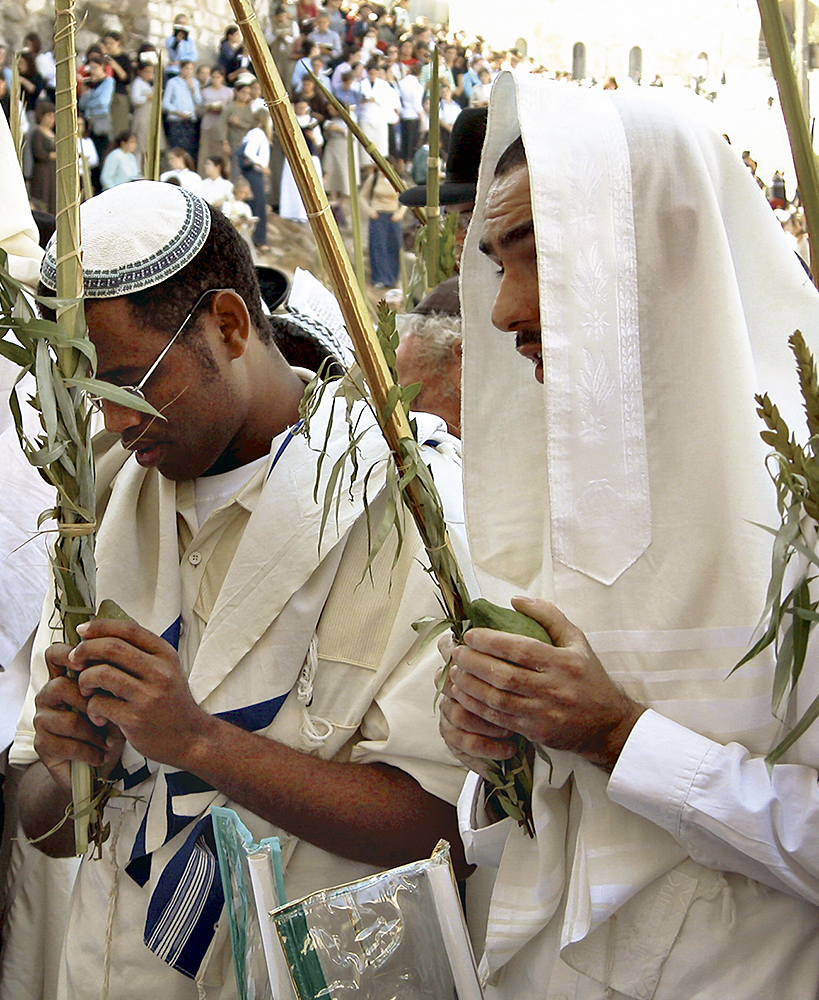
Bible, History, Archaeology
History,
Archaeology
Sukkot, Feast of Tabernacles
Contents:
Watch the video - Presentation text
Video from the program «À l'origine» hosted by Steve Suissa on France 2. With the participation of rabbi Michaël Azoulay and philosopher and producer Marc-Alain Ouaknin. © France 2.
Jewish autumn festival of thanksgiving (one of the Bible's Three Pilgrimage Feasts), the Feast of Tabernacles, Tents or Booths (Sukkoth) begins on the fifteenth day of the month of tishri (first month of the Jewish religious year), five days after the Yom Kippur, on the Day of Atonement. (Exodus 23,16; Zacharie 14; Leviticus 23,34).
Presentation
The Bible mentions the’Hag ha-Asif (the Autumn festival, Exodus 23, 16): «at the end of the year, when you bring in your harvest from the fields...», and the’Hag ha-Sukhot (the Feast of Tents, Leviticus 23, 34), reminiscent of the time when the Israelites lived in huts or tents made of branches (soukkoth) during their march through the desert, and thus magnify God's protection of the people.
 Image opposite: In front of the Kotel, Orthodox Jews celebrate the Feast of Tabernacles (Sukkot). It commemorates the Hebrew people's sojourn in the desert © Todd Bolen.
Image opposite: In front of the Kotel, Orthodox Jews celebrate the Feast of Tabernacles (Sukkot). It commemorates the Hebrew people's sojourn in the desert © Todd Bolen.
As a reminder, the Sukkot holiday is characterized by the construction of huts made of branches - under which meals are eaten and which evoke the idea of a return to social equality - and by the harvesting of four species of plants, as well as prayers of thanksgiving to God for the fertility of the earth.
The four plant species
Here are the Hebrew terms for the four plant species in Leviticus:
1) etz hadar, or citrus ;
2) t'marîm, date palms ;
3) etz avot, thick, deciduous trees and
4) arvey nahal, willows. In the 1st century CE, these species began to be identified as lemon, date palm, myrtle and willow. This is what we call them in Hebrew: Etrog, Lulav, Hadas and Aravah.
The seventh day, which receives within this joyous feast the special designation of Hoshana Rabba («Great Hoshana»), the four kinds of plants are taken around the synagogue seven times. The eighth day, which some people consider a separate festival, is called the Shemini Atzeret («the eighth day of the solemn assembly»), commemorates the sacrifice of a ram and an ox, which took place in biblical times as a sign of the people's special relationship with God.
In Israel, this eighth day also commemorates the end of the annual cycle of Torah readings, and is called Simḥat Torah («the rejoicing of the Law»). Outside Israel, Simḥat Torah is an independent celebration that takes place the day after the eighth day.

 Image opposite: In front of the Kotel, Orthodox Jews celebrate the Feast of Tabernacles (Sukkot). It commemorates the Hebrew people's sojourn in the desert © Todd Bolen.
Image opposite: In front of the Kotel, Orthodox Jews celebrate the Feast of Tabernacles (Sukkot). It commemorates the Hebrew people's sojourn in the desert © Todd Bolen.